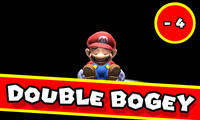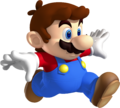Small Mario: Difference between revisions
m (→References) |
No edit summary |
||
| Line 35: | Line 35: | ||
{{br}} | {{br}} | ||
In pre-Fall 2017 versions of [[Super Mario Run]], [[Princess Peach|Peach]], [[Toad]], and [[Toadette]] didn't have small forms when getting hit. Instead, they died in one hit. In versions since the Fall 2017 update, they now shrink instead of dying in one hit. | |||
==Gallery== | ==Gallery== | ||
{{main-gallery|Small Mario}} | {{main-gallery|Small Mario}} | ||
Revision as of 08:31, September 28, 2017
- Not to be confused with Mini Mario.
Small Mario (formerly referred to as Regular Mario[1] or just simply Mario[2]) is the weakest form of the player character in the main Super Mario games. This form does not have any special abilities, and it also does not take any power-ups to assume this form, unlike other forms. Super Mario turns into Small Mario when he is hit by an enemy or obstacle. The player almost always starts the game off in this form (Super Mario Bros. 2, Super Mario 3D Land, Super Mario 3D World, and Captain Toad: Treasure Tracker are notable exceptions).
Any damage taken in Small form will cause Mario to lose a life. Usually, before being able to assume even stronger forms, Small Mario first must become Super Mario by eating a Super Mushroom. In Super Mario Bros., Super Mario Bros.: The Lost Levels, and the original and Super Mario All-Stars versions of Super Mario Bros. 3, if Small Mario gets a Fire Flower, the Fire Flower will only turn him into Super Mario, but as of Super Mario World, this was changed so that grabbing the Fire Flower will still turn him into Fire Mario.
In Super Mario Bros.: The Lost Levels, Super Mario or Fire Mario can also become Small Mario by touching a Poison Mushroom. Being Small Mario can sometimes be useful; in some games, like Super Mario Land, there are small crevices that can be reached only with Small Mario.
In Super Mario Bros. 2, Mario, Luigi, Toad and Princess Toadstool start out each life in Super form with two hit points (at the start of each level; they start with the current maximum hit points full after defeat), regardless of what their form was upon defeat or exiting the previous level. By finding the two Mushrooms hidden in Subspace, Mario can extend his maximum hit points to four; also, upon the Mushroom's collection, the character always regains full health. In Super Mario Advance, however, the Small form persists between levels and is the starting form for each life (as in the other 2D Mario games), and the maximum hit points per level is five, due to an added Mushroom per level.
This form also appears in most other 2D Super Mario games with the same effects.
In New Super Mario Bros. Wii, the Toads to be saved in the levels become Small Toads after being hit once by enemies.
Bowser was also turned small in the ending of Super Mario Galaxy 2, possibly as a side effect of using the power of the Grand Star's to make himself giant. When in this form, he could be jumped on by Mario and Yoshi, and could be hit by Yoshi's tongue.
In Super Mario 3D Land, Small Mario makes its 3D Super Mario debut, as previous 3D Mario games had a health meter. In this form, Mario loses his cap, making this form similar to Wario's Small form, as seen in Wario Land: Super Mario Land 3 (unless the player collects the maximum amount of lives (1,110 lives), which makes Super Mario lose the cap instead). He also has a higher-pitched voice. However, like in Super Mario Bros. 2, Mario starts out each life in his Super form. Additionally, in Super Mario 3D World, Peach, Toad, Rosalina, and Captain Toad can also get affected by this transformation, which works as it does in Super Mario 3D Land. As such, Peach and Rosalina's hair gets shorter, and the Toads' cap colors are reversed.
Captain Toad and Toadette's Small forms also appear in Captain Toad: Treasure Tracker, retaining the features from Super Mario 3D World (including the reversal of cap colors and higher-pitched voices). However, as in Super Mario Bros. 2, the Small form does not persist between levels; every level is started in Super form, regardless of what form the previous level was finished in.
When Mario gets a Double Bogey or below in Mario Golf: World Tour as well in Mario Sports Superstars, his animation depicts him getting hit by a shell, which turns him into Small Mario.
A similar form known as the Tiny status effect appeared in Paper Mario and Paper Mario: The Thousand-Year Door. This state could be inflicted by Hammer Bros. in the original and X-Naut PhDs and Bonetail in the sequel, or given to enemies by using a Shrink Stomp badge in both games, a Mini Mr. Mini, or Yoshi Kid's Mini-Egg in the sequel.
In The Super Mario Bros. Super Show!, there was no Small Mario. Regular Mario was Mario's weakest form. Mario could become "Super Mario" (actually Fire Mario) by using a Fire Flower, Starman or some other source of power. The concept of "Super Mario" was dropped for The Adventures of Super Mario Bros. 3 and Super Mario World, which followed the physics of their respective games more closely.
In pre-Fall 2017 versions of Super Mario Run, Peach, Toad, and Toadette didn't have small forms when getting hit. Instead, they died in one hit. In versions since the Fall 2017 update, they now shrink instead of dying in one hit.
Gallery
- For this subject's image gallery, see Gallery:Small Mario.
- Artwork1.png
Trivia
- Due to certain glitches in Super Mario Bros. and the Japanese version of Super Mario Bros. Deluxe, it is possible to turn into Fire Mario while remaining Small.
Names in other languages
| Language | Name | Meaning | Notes |
|---|---|---|---|
| Dutch | Kleine Mario[?] | Small Mario | |
| German | Klein-Mario[?] | Small Mario | |
| Italian | Piccolo Mario[?] | Small Mario | |
| Korean | 꼬마리오[3] Kkomario |
Portmanteau of 꼬마 kkoma (kid) and 마리오 (Mario) | |
| Portuguese | Mario Pequeno[?] | Small Mario | |
| Russian | Маленький Марио[?] Malen'kiy Mario |
Small Mario | |
| Spanish | Peque Mario[?] | Pun on the word pequeño (small) |
References
- ^ Super Mario Bros. Deluxe Prima Games guide, page 8.
- ^ Super Mario Bros. English instruction manual, page 8.
- ^ New Super Mario Bros. Instruction manual, Nintendo Korea
- Mario's Transformations
- Hotel Mario
- New Super Mario Bros. Forms
- New Super Mario Bros. 2 Forms
- New Super Mario Bros. U Forms
- New Super Mario Bros. Wii Forms
- Puzzle & Dragons: Super Mario Bros. Edition Leaders and Helpers
- Super Mario 3D Land Forms
- Super Mario 3D World Forms
- Super Mario Bros.
- Super Mario Bros.: The Lost Levels
- Super Mario Bros. 2
- Super Mario Bros. 3 Forms
- Super Mario Bros. Deluxe
- Super Mario Land
- Super Mario Land 2: 6 Golden Coins Forms
- Super Mario Maker Forms
- Super Mario World Forms




